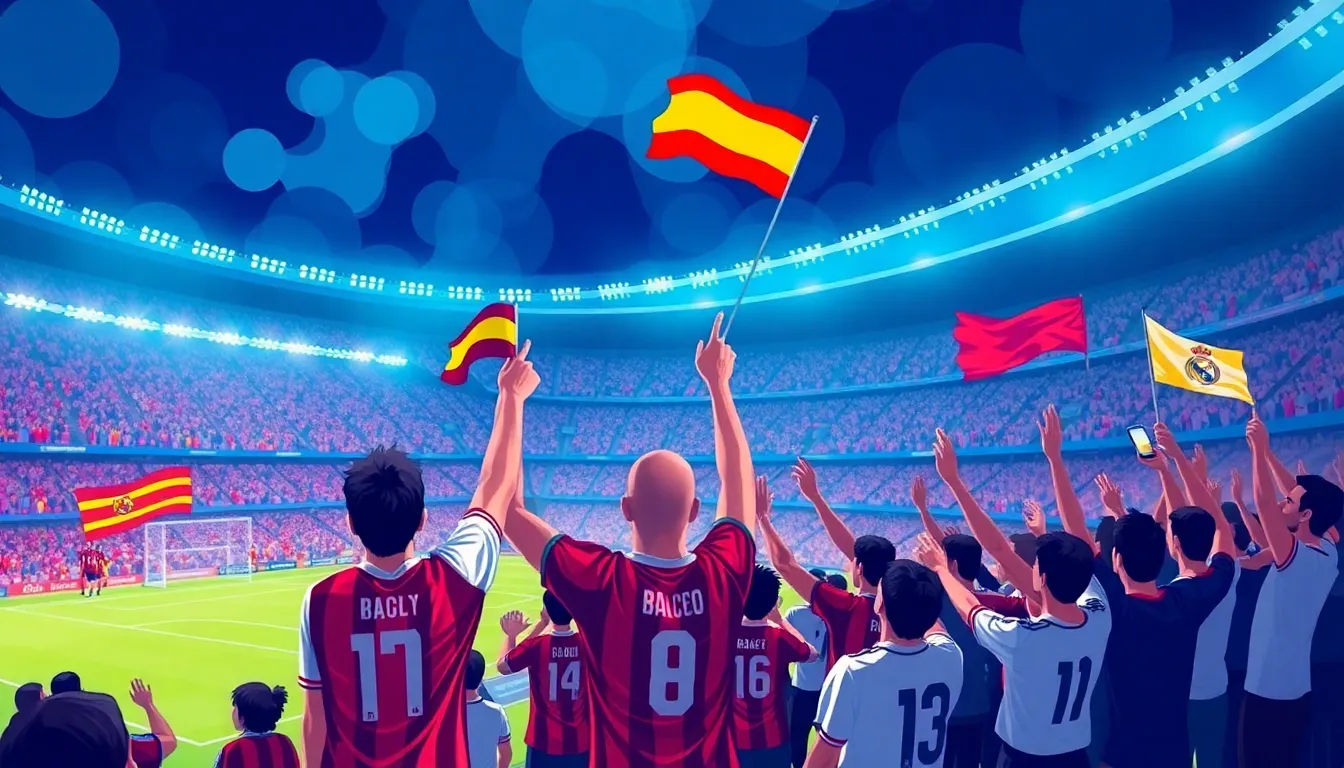Spain isn’t just known for its stunning architecture and delicious tapas; it’s also a powerhouse of sports that’ll make any fan’s heart race. From the electrifying atmosphere of a football match to the graceful movements of flamenco dancing, Spain boasts a sports culture that’s as vibrant as its festivals.
Famous Sports In Spain
Football ranks as the most popular sport in Spain, capturing the hearts of millions. La Liga, Spain’s premier football league, features top clubs like FC Barcelona and Real Madrid. Matches create an electric atmosphere, drawing large crowds and significant media attention.
Basketball also enjoys considerable popularity, with Liga ACB serving as the top-tier league. The Spanish national team achieved impressive success, winning the FIBA Basketball World Cup in 2006 and 2019. Many players like Pau Gasol garnered international recognition.
Tennis holds a special place in the sports landscape. Rafael Nadal, a prominent figure, secured numerous Grand Slam titles. His achievements inspire a new generation of tennis players across Spain.
Bullfighting often sparks debate yet remains an iconic tradition. Events like the running of the bulls during the San Fermín festival attract tourists and locals alike. This sport intertwines with Spain’s cultural history, showcasing a unique blend of skill and bravery.
Cycling enjoys a robust following, with prestigious events such as Vuelta a España. The race, equivalent to the Tour de France, showcases the diverse Spanish terrain. Riders compete fiercely and gain exposure to stunning landscapes.
Motorsport, particularly Formula 1 and MotoGP, captivates fans. Spanish drivers, such as Fernando Alonso, have achieved remarkable success on the international stage. Events attract large spectator numbers and considerable media coverage.
Each of these sports contributes to Spain’s vibrant culture, reflecting its traditions and passion for athletic excellence.
Popular Team Sports

Spain’s sports culture thrives on teamwork and community spirit, with soccer and basketball standing out as the most celebrated team sports.
Soccer
Soccer reigns supreme in Spain, captivating millions with its passionate fan base. La Liga showcases top-tier clubs like FC Barcelona and Real Madrid, creating fierce rivalries. The excitement of El Clásico, the match between these two giants, captures worldwide attention. National pride stems from the success of the Spanish national team, which clinched the FIFA World Cup in 2010. Players such as Sergio Ramos and Andrés Iniesta are lauded for their contributions to the sport. Local clubs also play vital roles, fostering community engagement and youth development. Major tournaments like Copa del Rey further amplify interest, ensuring soccer remains at the heart of Spanish culture.
Basketball
Basketball has experienced significant growth in Spain, especially since the national team’s triumph in the 2006 FIBA World Cup. The Liga ACB features competitive teams like FC Barcelona B.C. and Real Madrid B.C., drawing large crowds. Players such as Pau Gasol and Ricky Rubio have achieved global recognition, inspiring young athletes. The success of the national squad reflects Spain’s strong basketball tradition. International competitions, including the EuroBasket, highlight Spain’s prowess on the court. Schools and clubs nurture basketball talent, making it an integral part of Spain’s sporting landscape.
Traditional Sports Unique to Spain
Spain’s rich cultural heritage includes several traditional sports, each with its own unique history and significance.
Bullfighting
Bullfighting ranks among Spain’s most iconic traditional sports, showcasing a blend of artistry and bravery. This controversial spectacle takes place in arenas across the country, particularly during festivals. Participants, known as matadors, demonstrate skill and flair while engaging with the bull. Regions such as Andalusia and Madrid host some of the most famous events, drawing thousands of spectators. Criticism surrounds bullfighting due to animal rights concerns, yet its deep-rooted history continues to influence Spanish culture. Fans appreciate the ritualistic aspects, including the music and choreography, which contribute to its allure.
Pelota
Pelota represents another traditional Spanish sport, characterized by its fast-paced nature and unique playing style. This game, known for its various forms, involves hitting a ball against a wall with a racket or hand. Particularly popular in the Basque Country, pelota combines speed and precision, captivating both players and spectators. Different versions exist, including frontón and jai alai, each with distinct rules and gameplay. Pelota matches often attract large crowds, especially during local festivals, showcasing community spirit and athletic prowess. This sport reflects Spain’s diverse regional identities, enriching its cultural tapestry.
The Rise of Individual Sports
Spain experiences a growing interest in individual sports, exemplified by tennis and Formula 1 racing. These sports not only attract fans but also showcase exceptional talent.
Tennis
Tennis thrives in Spain, largely due to the achievements of Rafael Nadal. With 22 Grand Slam titles, Nadal inspires young athletes nationwide. The country boasts numerous training academies that develop budding tennis players. Players like Garbiñe Muguruza have also gained international acclaim, further elevating Spain’s status in the sport. Major tournaments, including the Barcelona Open Banc Sabadell and the Madrid Open, draw significant crowds and media coverage while enhancing local interest in tennis. Rising talent and established stars contribute to a vibrant tennis culture that unites fans from diverse backgrounds.
Formula 1 Racing
Formula 1 racing enjoys immense popularity in Spain, highlighted by the success of Fernando Alonso. Alonso, a two-time World Champion, captivates fans with his remarkable skill on the track. The Spanish Grand Prix hosted at Circuit de Barcelona-Catalunya attracts thousands of spectators each year, creating an electrifying atmosphere. Teams like Scuderia Ferrari and Alpine have strong Spanish connections, making the sport even more engaging for local fans. The presence of several talented drivers in the sport continues to inspire a new generation. Growing sponsorships and media coverage further enhance the allure of Formula 1 racing in Spain.
The Impact of Sports on Spanish Culture
Sports significantly shape Spain’s cultural landscape. They unite communities and foster a sense of identity. Football, as the most popular sport, provides a common ground for fans. La Liga matches create a thrilling atmosphere, drawing spectators who passionately support their teams. El Clásico epitomizes rivalry, captivating not only fans but also international audiences.
Basketball plays a crucial role in promoting collaboration and healthy competition among youth. The national team’s success in major tournaments inspires young players to pursue their dreams. Schools actively nurture talent, leading to increased participation in leagues like Liga ACB. Pau Gasol and Ricky Rubio serve as role models, motivating aspiring athletes.
Tennis has gained immense popularity, largely due to Rafael Nadal’s remarkable achievements. His dominance in Grand Slam events has encouraged a new generation to embrace the sport. Training academies across Spain develop promising talent, ensuring tennis’s place in the nation’s sporting culture. Tournaments such as the Barcelona Open draw attention and enhance local pride.
Bullfighting, despite its controversy, embodies Spain’s historical traditions. The spectacle remains prevalent, especially during festivals like San Fermín. Many view this event as an essential aspect of Spanish culture, showcasing bravery and artistry. Pelota also demonstrates regional sportsmanship, particularly in the Basque Country, where local festivals celebrate the game. The fast-paced nature of pelota reflects community bonds, reinforcing cultural pride.
Cycling, highlighted by Vuelta a España, showcases Spain’s stunning landscapes and promotes physical fitness. Motorsport, particularly Formula 1, captures fans’ excitement, especially with the success of driver Fernando Alonso. Each sport contributes uniquely to the rich tapestry of Spanish culture, reflecting the nation’s diversity and passion for athleticism.
Conclusion
Spain’s sports scene is a vibrant reflection of its culture and identity. From the electrifying atmosphere of football matches to the grace of tennis and the thrill of motorsport, each sport contributes uniquely to the national spirit.
The passion for competition fosters community connections and inspires future generations of athletes. With legends like Rafael Nadal and the fierce rivalries in La Liga, Spain remains a powerhouse in the sports world.
As sports continue to evolve in Spain, they will undoubtedly remain a source of pride and unity for its people.

